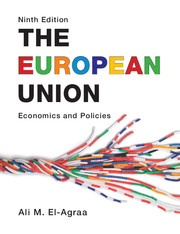Book contents
- Frontmatter
- Contents
- Figures
- Tables
- Boxes
- Contributors
- Preface
- A reader’s guide
- Abbreviations
- 1 General introduction
- Part I EU history, institutions and legal dimension
- Part II EU market integration
- Part III EU monetary integration
- Part IV The single European market
- 13 Competition policy
- 14 Industrial and competitiveness policy
- 15 Tax harmonization
- 16 Transport policy
- 17 Energy policy and energy markets
- 18 Environmental policy
- Part V EU budget and structural policies
- Part VI EU external relations
- Part VII The future of the EU
- Bibliography
- Author Index
- Index
- References
16 - Transport policy
from Part IV - The single European market
- Frontmatter
- Contents
- Figures
- Tables
- Boxes
- Contributors
- Preface
- A reader’s guide
- Abbreviations
- 1 General introduction
- Part I EU history, institutions and legal dimension
- Part II EU market integration
- Part III EU monetary integration
- Part IV The single European market
- 13 Competition policy
- 14 Industrial and competitiveness policy
- 15 Tax harmonization
- 16 Transport policy
- 17 Energy policy and energy markets
- 18 Environmental policy
- Part V EU budget and structural policies
- Part VI EU external relations
- Part VII The future of the EU
- Bibliography
- Author Index
- Index
- References
Summary
Introduction
Transport is an integral part of any economic or social structure. Military conquests in the past were largely along well-defined, natural transport corridors or, in the case of the Roman Empire, along man-made infrastructure. In terms of lifestyles, the growth of cities has mainly been at important junctions in transport networks. Technology advances and changes in political ambition, as well as new economic conditions and institutional developments, have altered the nature of this link, but its fundamental importance remains. The role of transport as a lubricator of economic reconstruction was appreciated in the post-Second World War period. Institutions such as the European Conference of Ministers of Transport (ECMT), were set up under the Marshall Plan (1948) to assist in reconstructing transport infrastructure, while the European Coal and Steel Community (ECSC, 1951) devoted energies to improving the efficiency of the European rail transport system. It was even more transparent in the formation of the European Economic Community (EEC, 1957), whereby the explicit creation of a Common Transport Policy (CTP) was mandated (see Chapters 2 and 17).
Transport is also a major industry. It directly employs about 7 per cent of the EU’s workforce, accounts for 7 per cent of EU GDP and for about 30 per cent of final energy consumption (see Chapter 17). But this is perhaps not really the important point. From an economic perspective, the crucial point about transport is its role in facilitating trade and allowing individuals, companies, regions and nation states to exploit their various comparative advantages. Early debates concerning the merits of free trade tended to assume away the friction associated with moving goods to markets, and the analysis of migration patterns exhibited similar tendencies to assume transport costs to be negligible. Some economists did take account of transport costs when trying to explain land use patterns, but such explicit consideration of space and the problems of traversing it was exceptional. The situation changed with the advent of new transport technologies in the mid-nineteenth century and as countries appreciated that manipulation of the transport system could influence their economic conditions. However, the manipulation of transport rates and the strategic design of infrastructure networks were used to protect domestic industries in ways akin to tariff and non-tariff trade barriers (NTBs; see Chapter 6).
- Type
- Chapter
- Information
- The European UnionEconomics and Policies, pp. 244 - 256Publisher: Cambridge University PressPrint publication year: 2011
References
- 1
- Cited by



